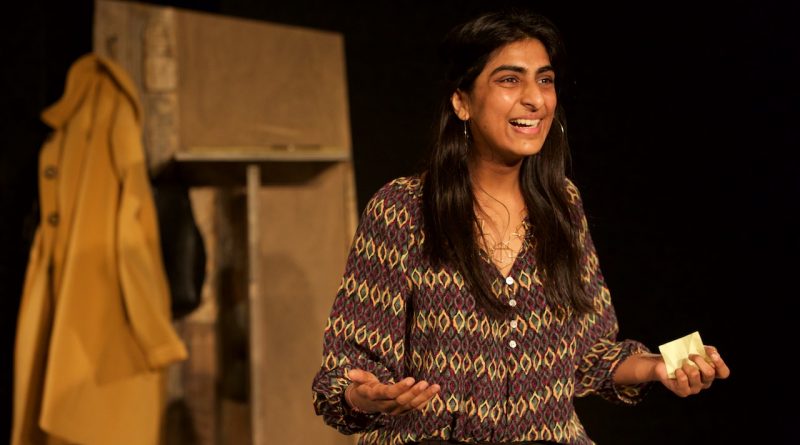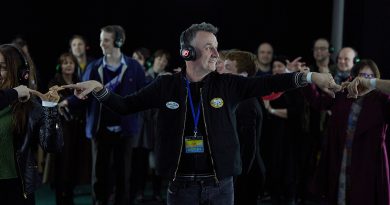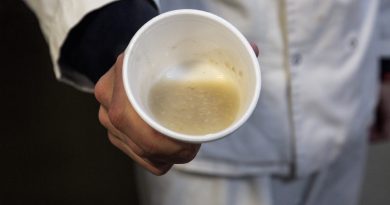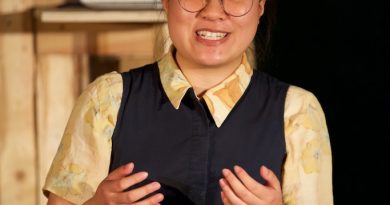Where I Live and What I Live For by Rabiah Hussain (Are We Where We Are? Shop Front Theatre, Coventry, 10 October 2017)
reviewed by Stella Backhouse
Presented as the third instalment of Theatre Absolute Coventry’s Are We Where We Are series, Rabiah Hussain’s new one-act single-hander Where I Live and What I Live For packs a punch in more ways than one.
The action begins with Saliha (convincingly and poignantly portrayed by Raagni Sharma) arriving back at her east London flat in an agitated state. Rifling through a small box that seems to contain nothing but dog-eared old Post-it notes, she eventually finds the one she’s looking for. It bears the legend ‘water off a duck’s back’.
The words were written, she explains, by her father, many years before. Recently-arrived in London from Pakistan and eager to adapt to British life, he formed the habit of jotting down unfamiliar English expressions on Post-it notes, which he then stuck around the house to aid his learning. His belief was that by understanding the meanings of their language, he would reach an understanding of the British themselves.
What follows is a delicately-paced unfolding of the parallel – but mirrored – experiences of two generations. In the opening minutes the audience learns that something bad happened to Saliha’s father; but only towards the end is it revealed that he was attacked by drunken co-workers who “called him a Paki, innit”. From his hospital bed, her father tells Saliha not to worry because the assault is “water off a duck’s back”. Traumatised, the family relocates to Bradford.
Fast-forward twenty years. Heading back to London to take up her dream-job, Saliha is immediately befriended by Sarah, a white colleague from an apparently affluent Home Counties background. The pair become inseparable, and against Saliha’s parents’ advice (“It’s not like that now” she eye-rollingly reassures them), plan to rent a flat together.
The crisis comes on a night out. One of Sarah’s friends leaves out Saliha from a drinks round because she’s Muslim. A tipsy Sarah interrupts with the words
She is. But she’s different.
The word “different” unblocks something in Saliha. She feels it is “loaded” and demands to know what Sarah meant. Sarah shrugs it off as:
a compliment. You fit in with the rest of us. You’re progressive
and tells Saliha that if she’s offended she should “pretend it never happened. Ignore me”. With the words ‘water off a duck’s back’ echoing round her head, Saliha punches Sarah. The play ends on the brink of the inevitable collision between harsh reality and Saliha’s naïve fantasy: the police hammering on her door while she waits alone in her room.
Because this is a play about surfaces: what lies beneath them and how we use each other as surfaces to reflect our self-image. Flattered by the attentions of the over-friendly Sarah, Saliha seems oblivious to the possibility that she is wanted not for herself, but for what she represents: a trophy that Sarah can wave around to signal – to other white people – her right-on, multicultural credentials.
Unfortunately for Saliha however, this is a two-way mirror and she is caught in the middle of it. Back in Bradford, the parochial friends she left behind tut at her relationship with Sarah and view it as potentially dangerous. (Turns out they’re right, but surely the solution is not for women to simply remain in their home communities for life? Perhaps Saliha’s real problem is that she has so few opportunities to be authentically herself.)
Integral to our construction of surfaces is language; and – with respect to Saliha’s father – the play invites us to ponder its reliability as a vehicle for true meaning. In London, Saliha encounters a world where ‘different’ now means ‘different on the surface, the same as us underneath’, and racism is signalled not overtly – through unambiguously offensive words like ‘Paki’ – but latently, through objectively neutral language deployed in particular ways.
It is perhaps in this context that Saliha’s slightly problematic physical assault on Sarah should be read: not as an action that drags her down to the level of the racists who attacked her father, but as a symbolic smashing through the serene surface of the duck’s back to expose the hurt and confusion beneath.
Where I Live And What I Live For is a plea for cross-cultural understanding. Without this, the answer to the question ‘are we where we are?’ will remain a resounding ‘no’. Hussain argues that socially unacceptable overt racism has now been replaced by something that is, arguably, worse: a topsy-turvy impossible-to-navigate labyrinth of is-it-isn’t-it micro-aggressions where words mean their opposites and even friendship is a form of discrimination.
It doesn’t look like a duck, it doesn’t quack like a duck – so what is it? Not a duck? Or a duck in disguise?





